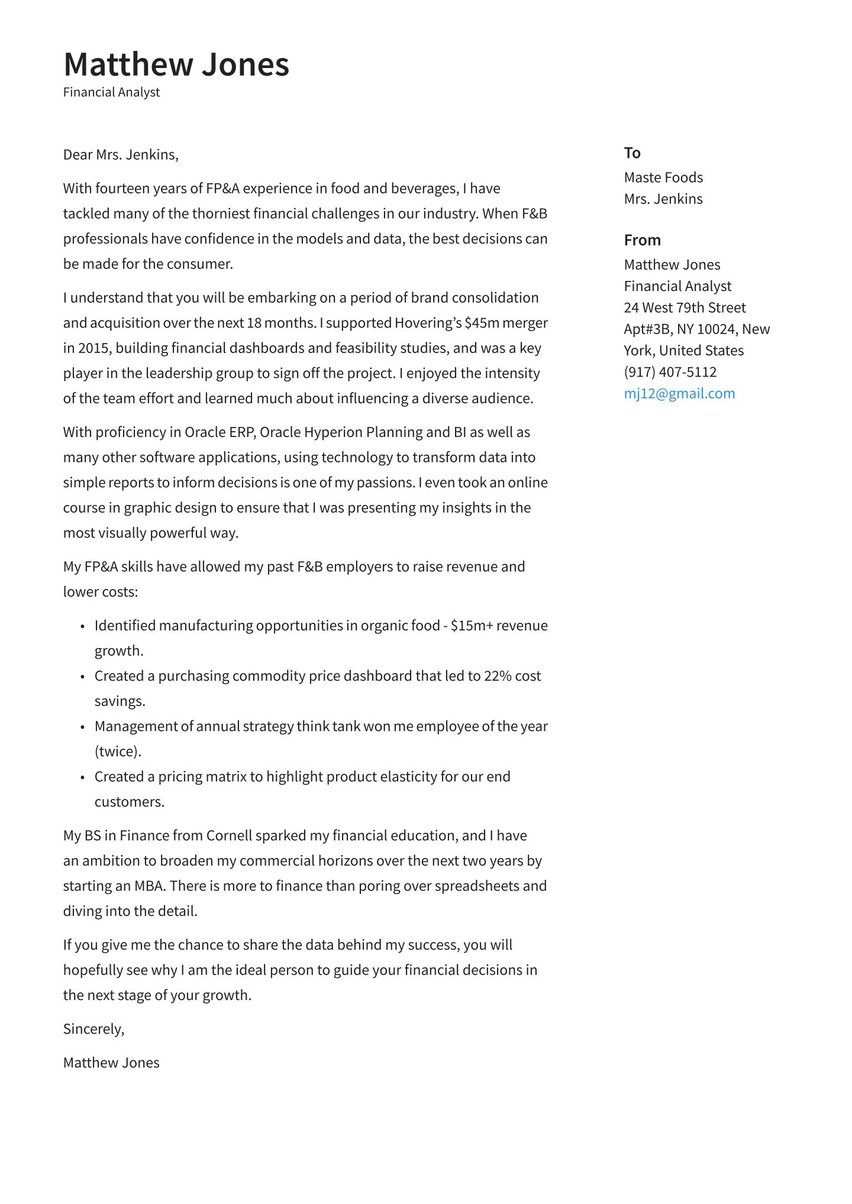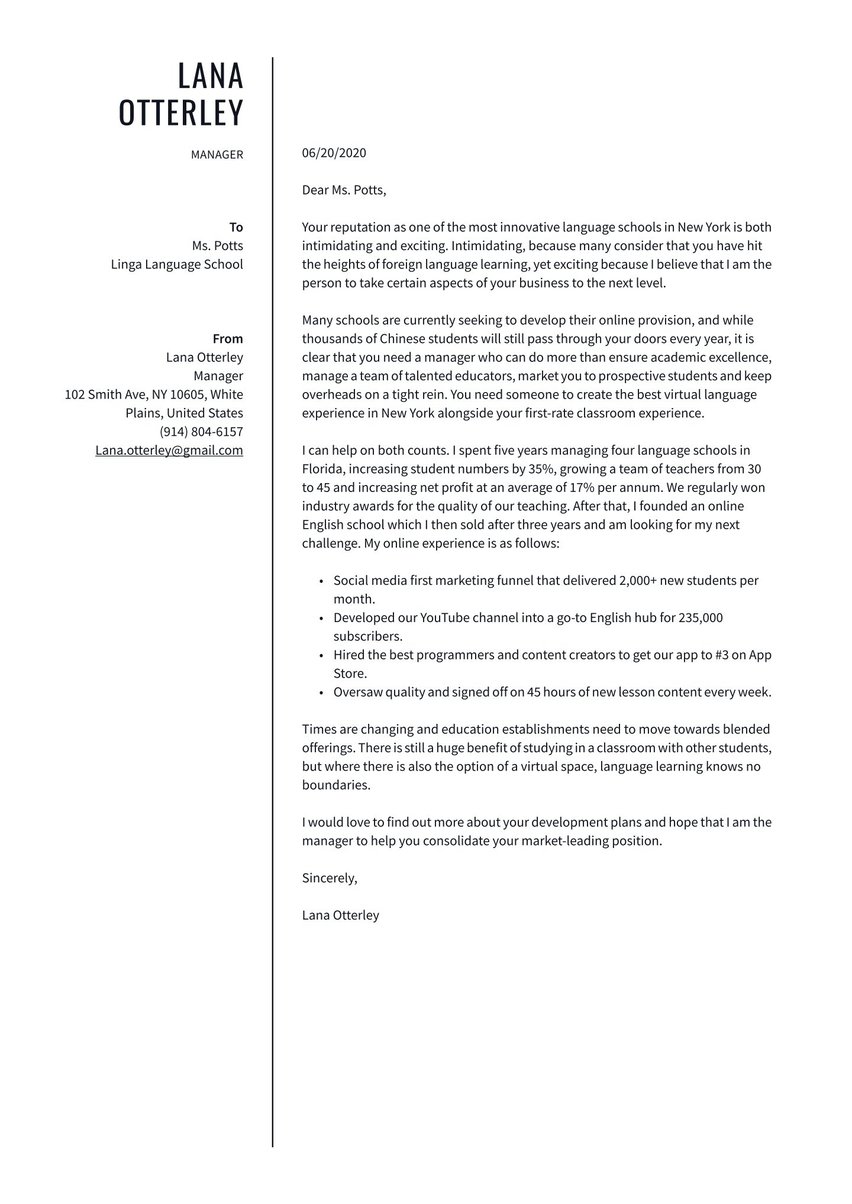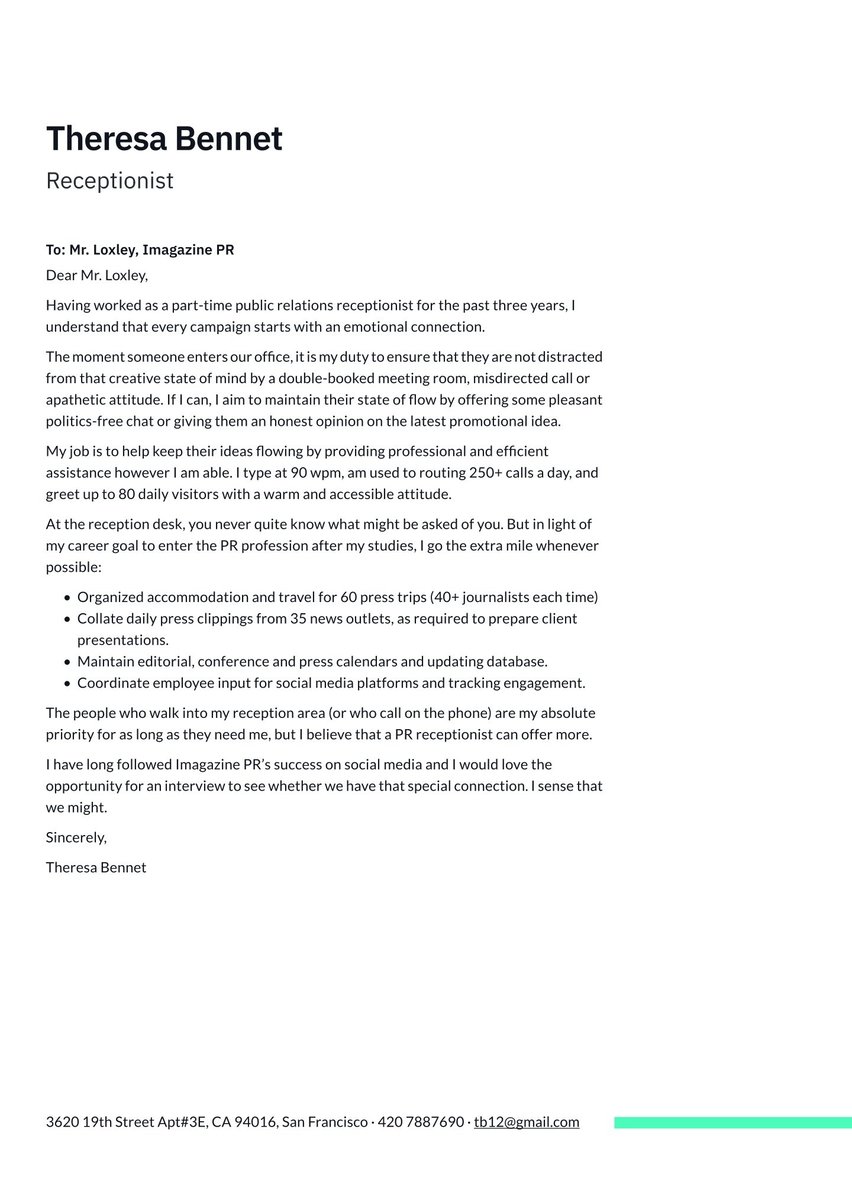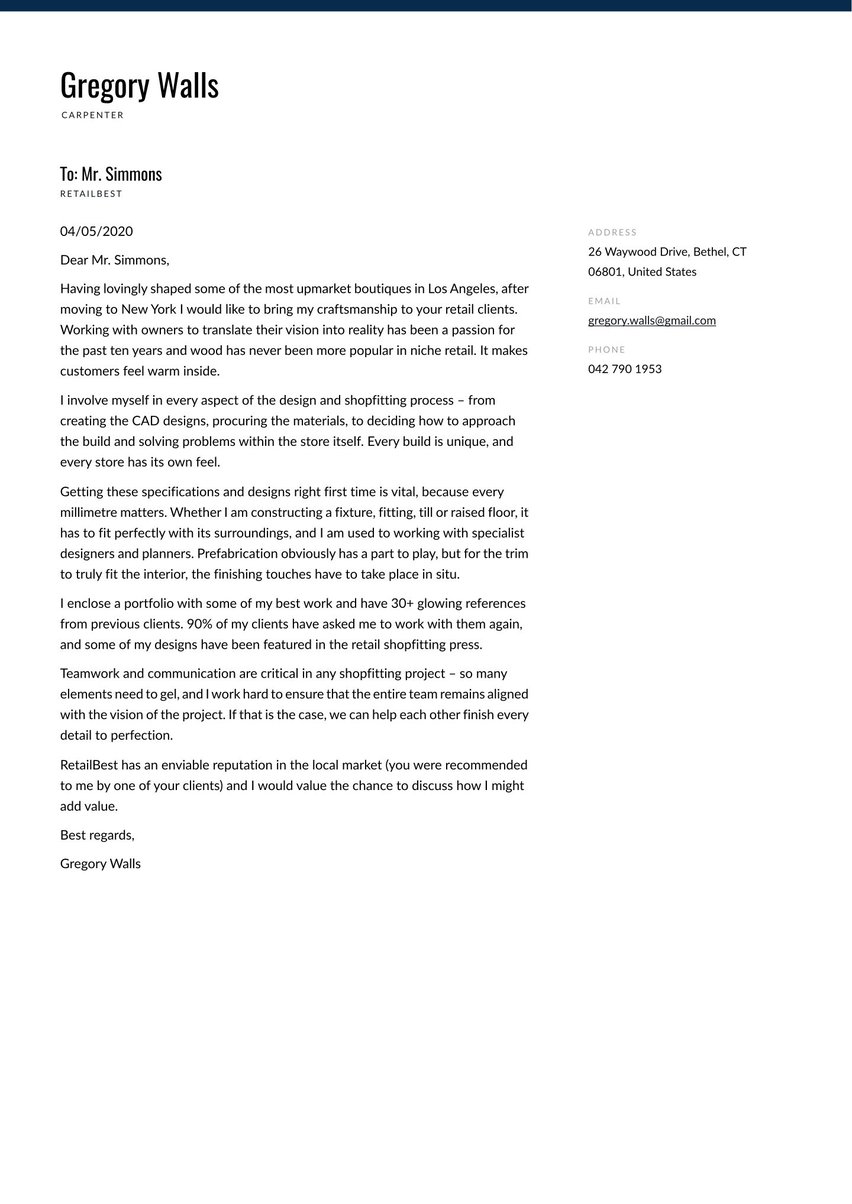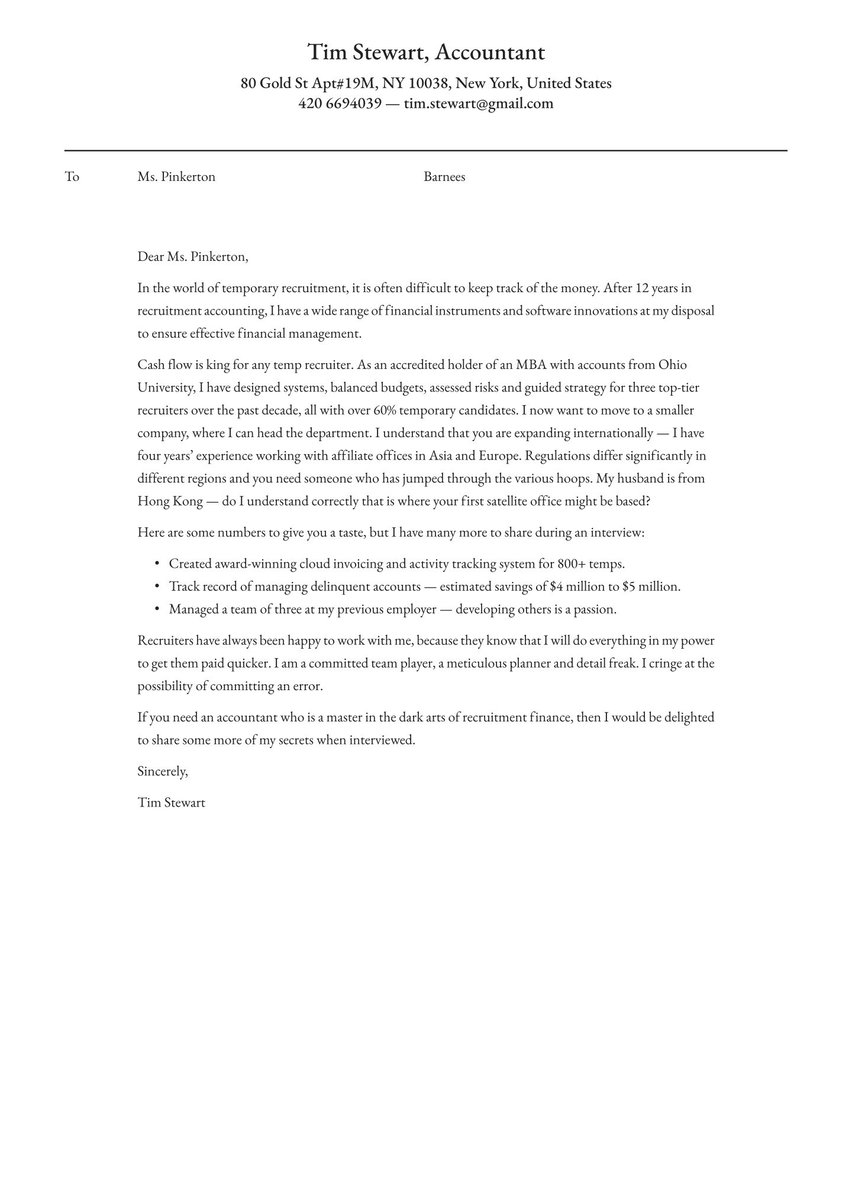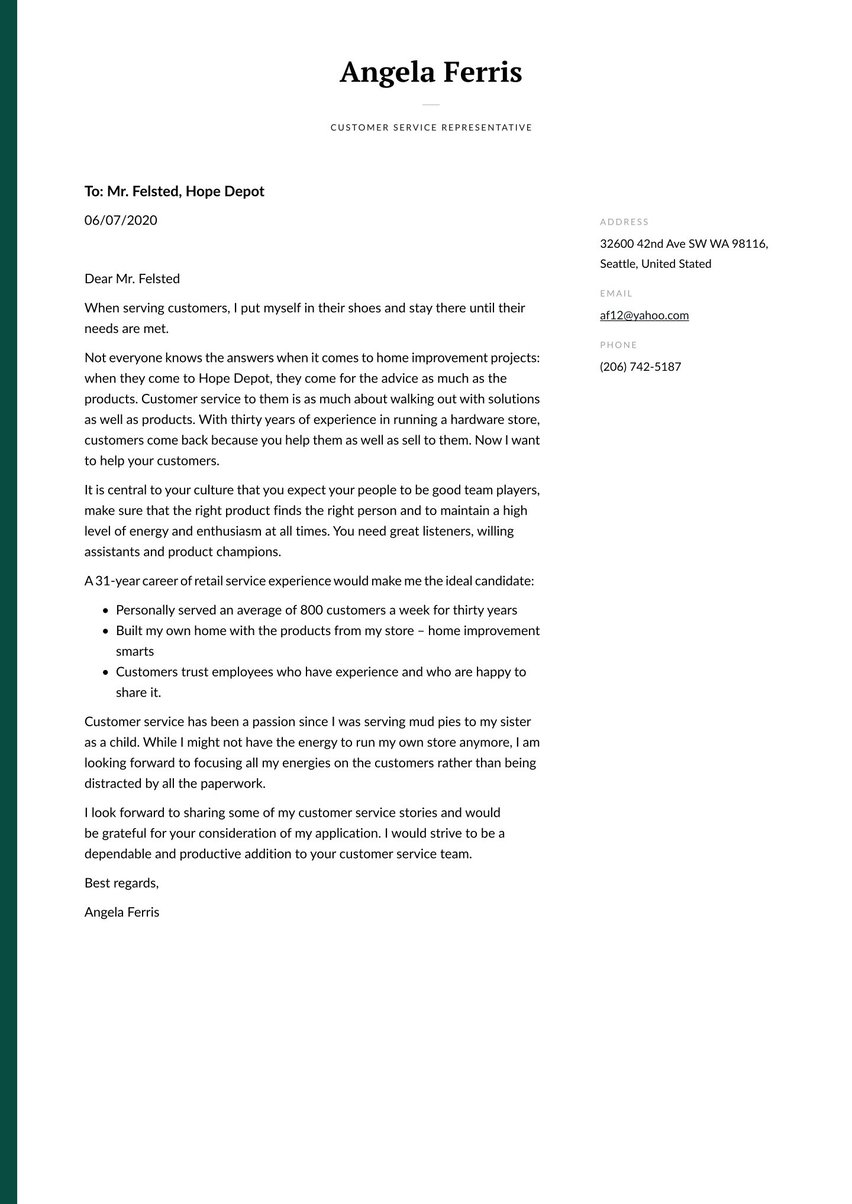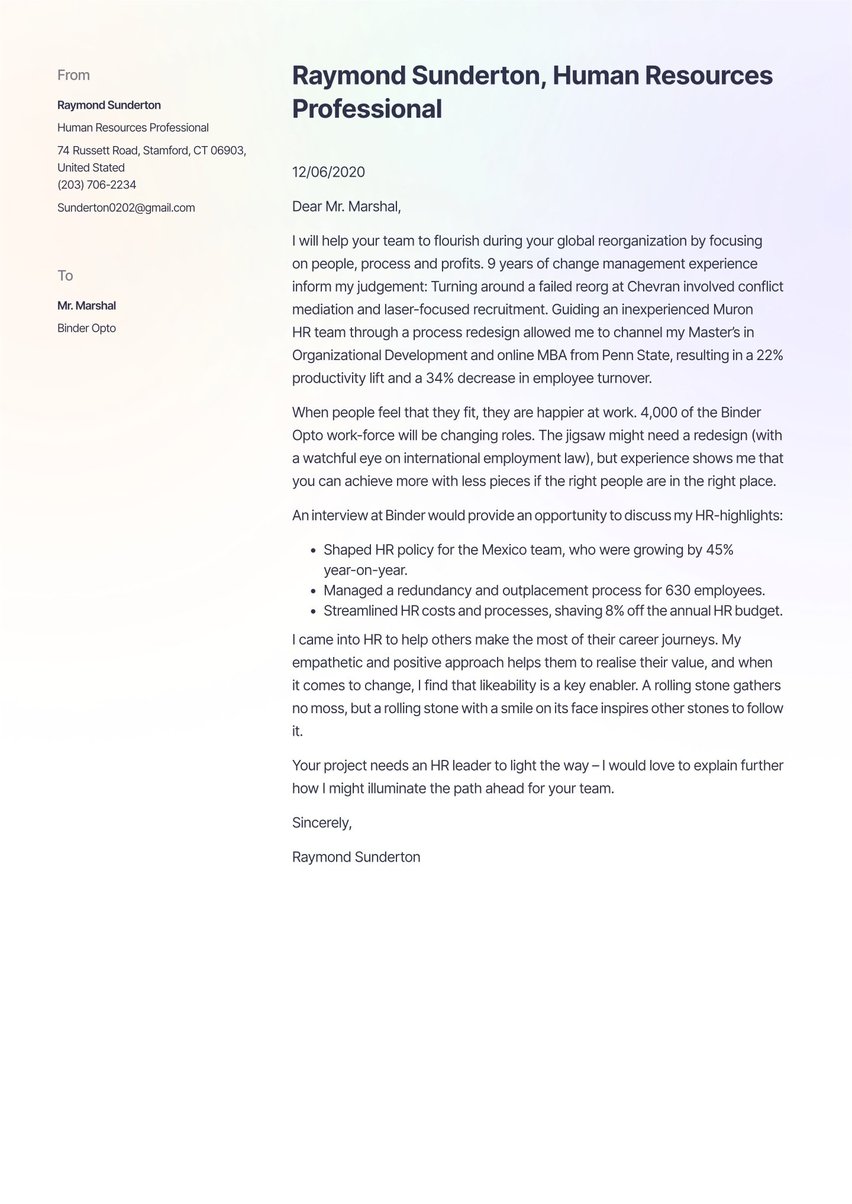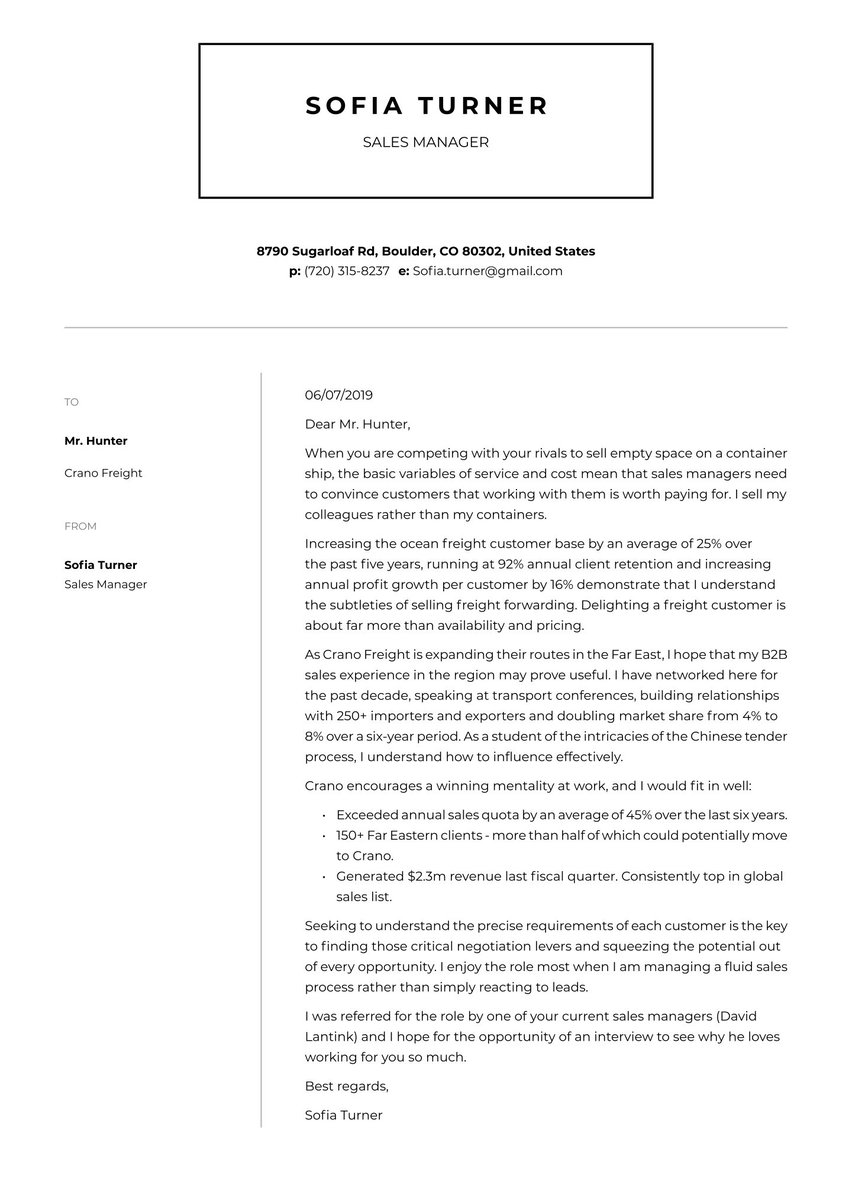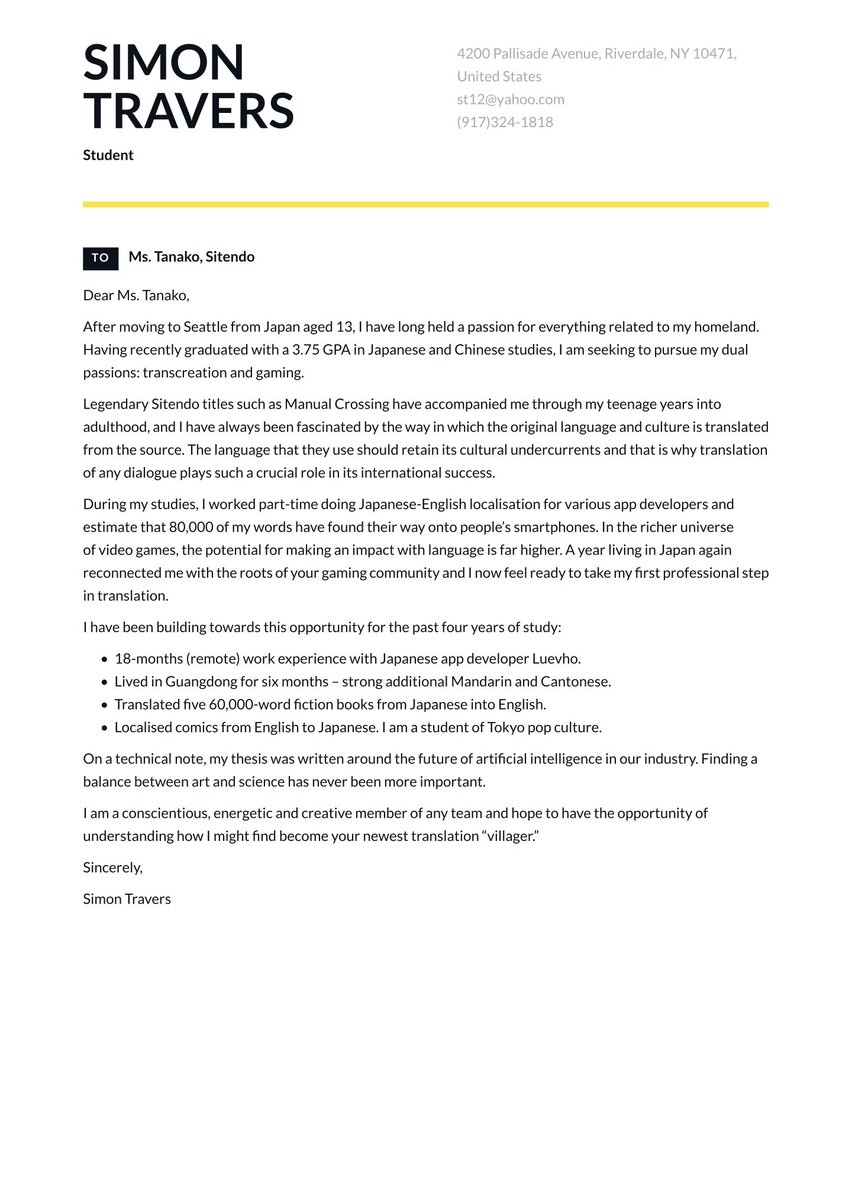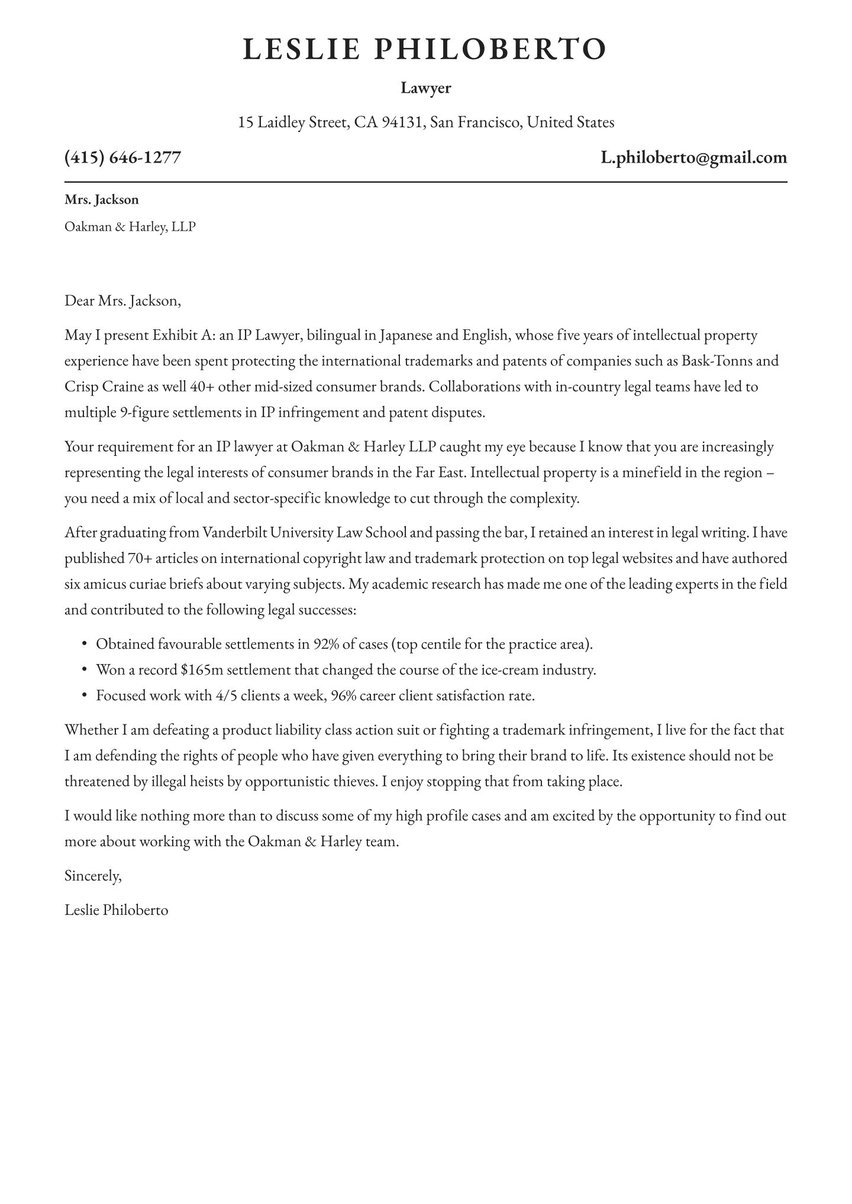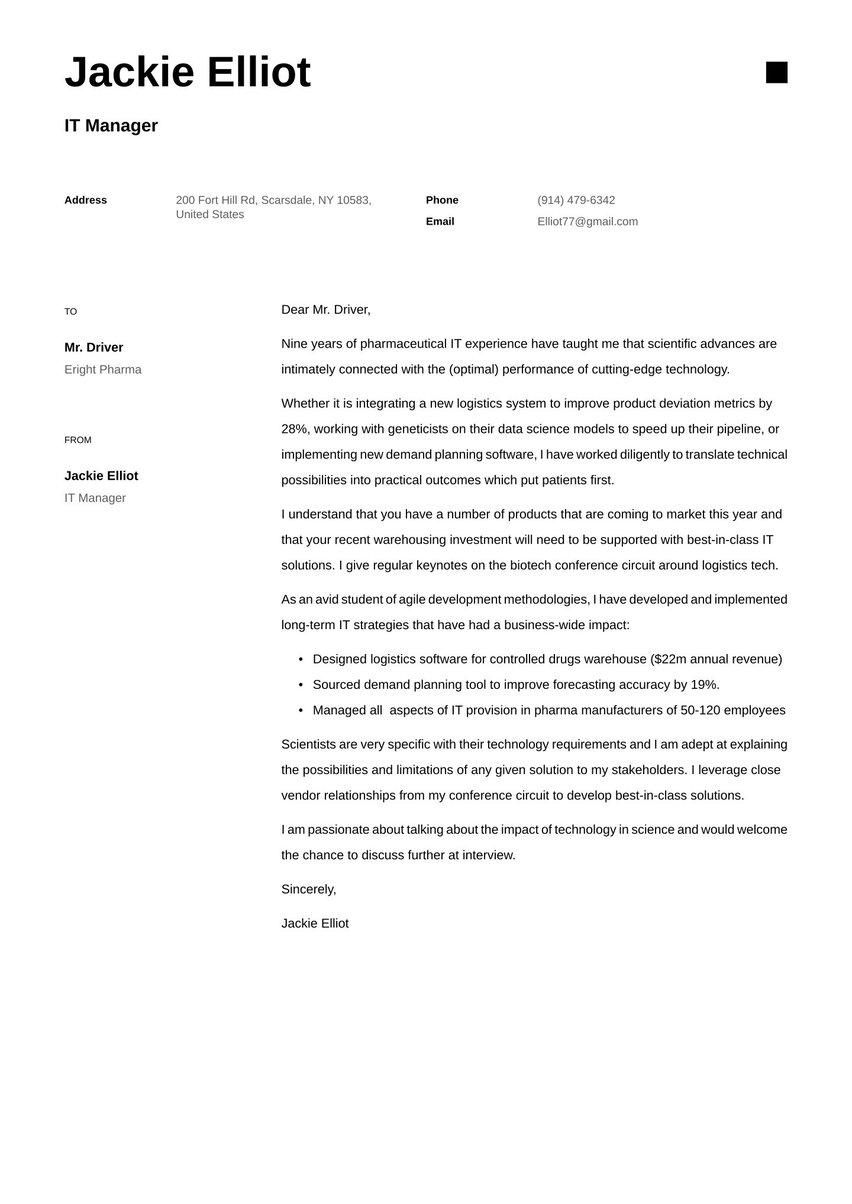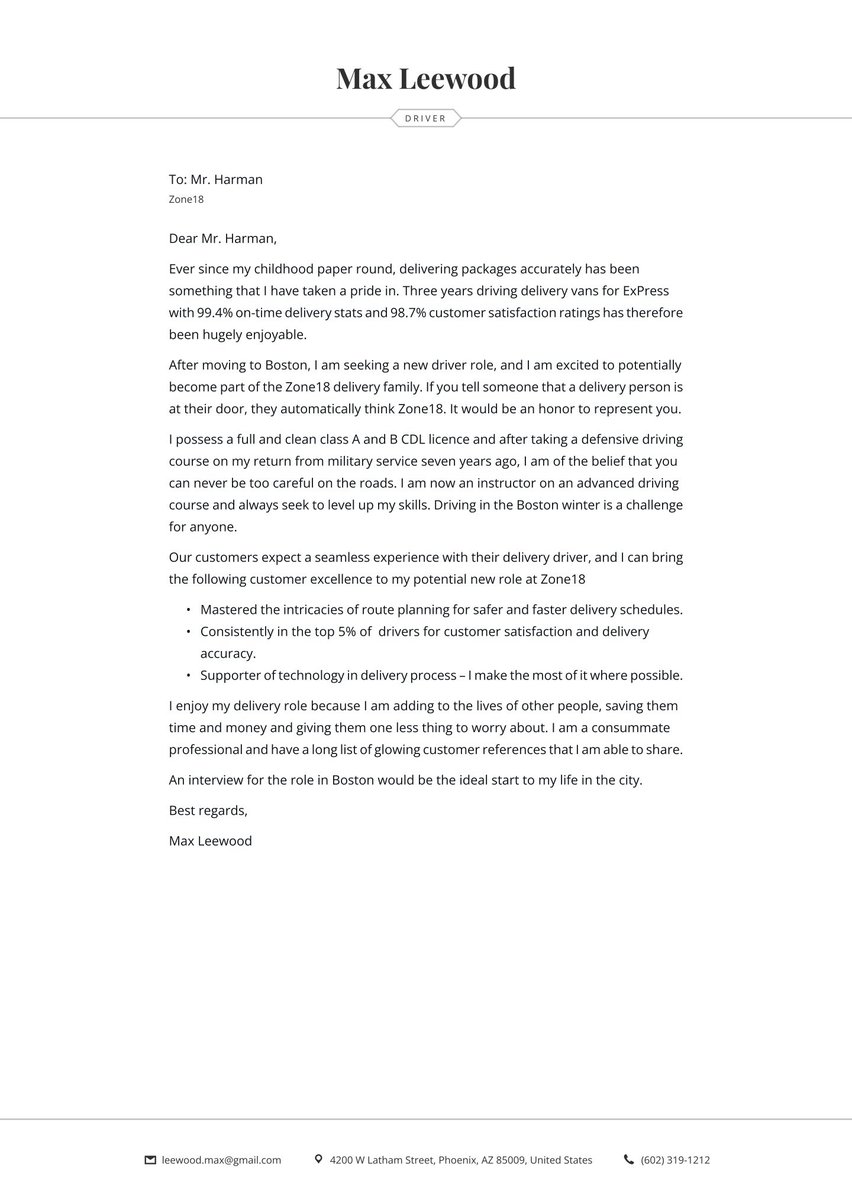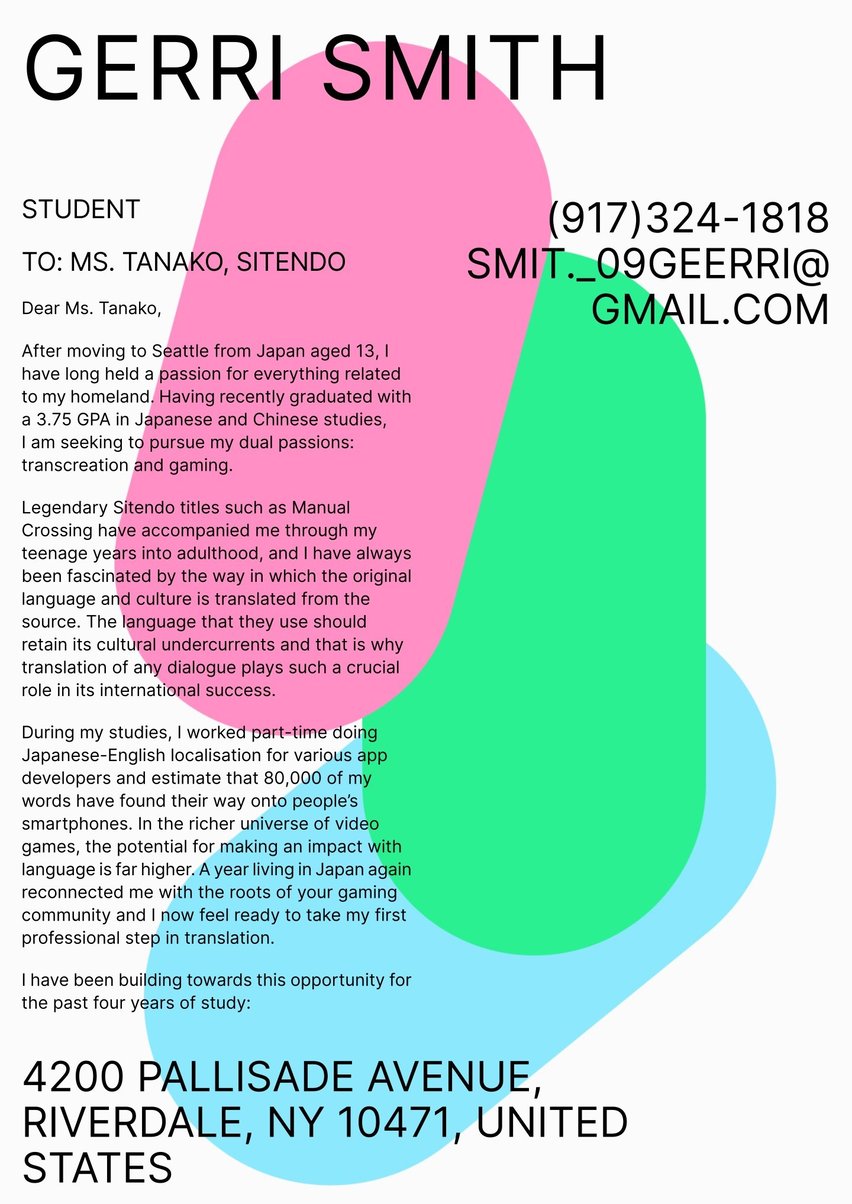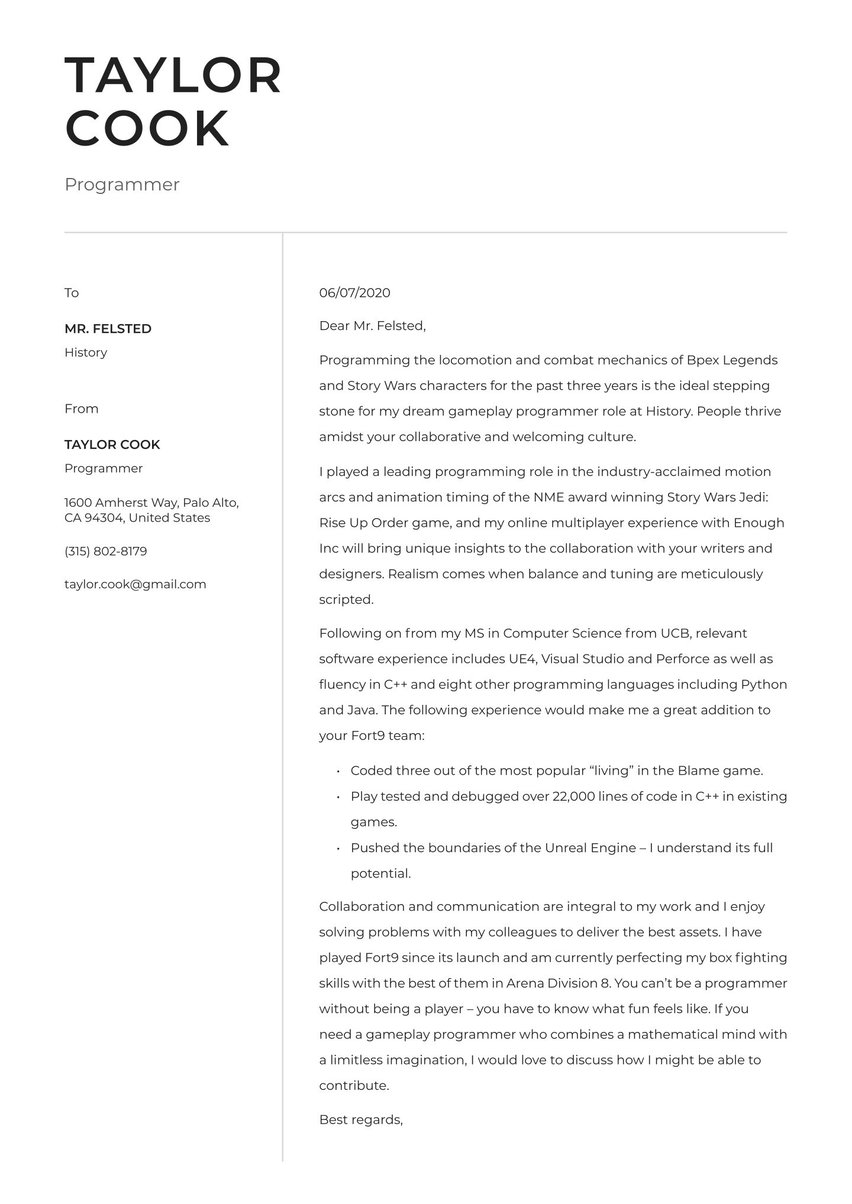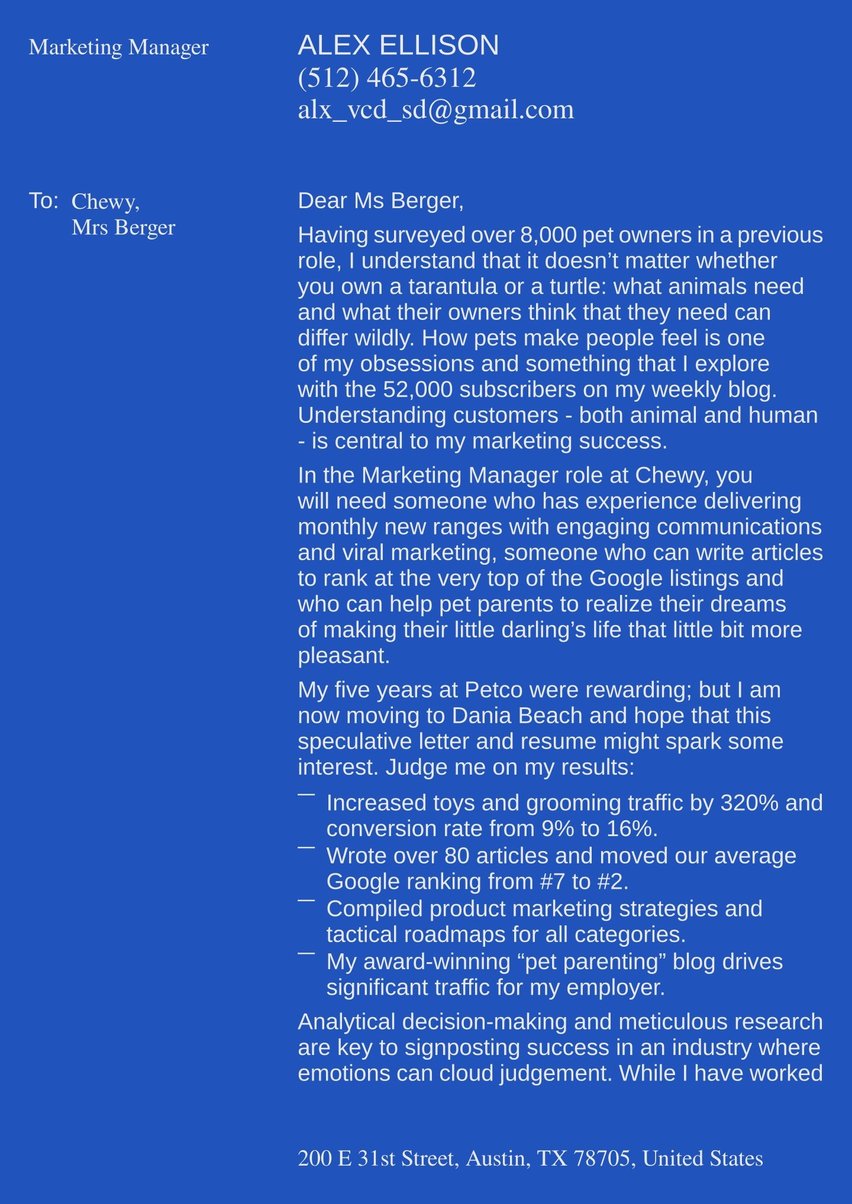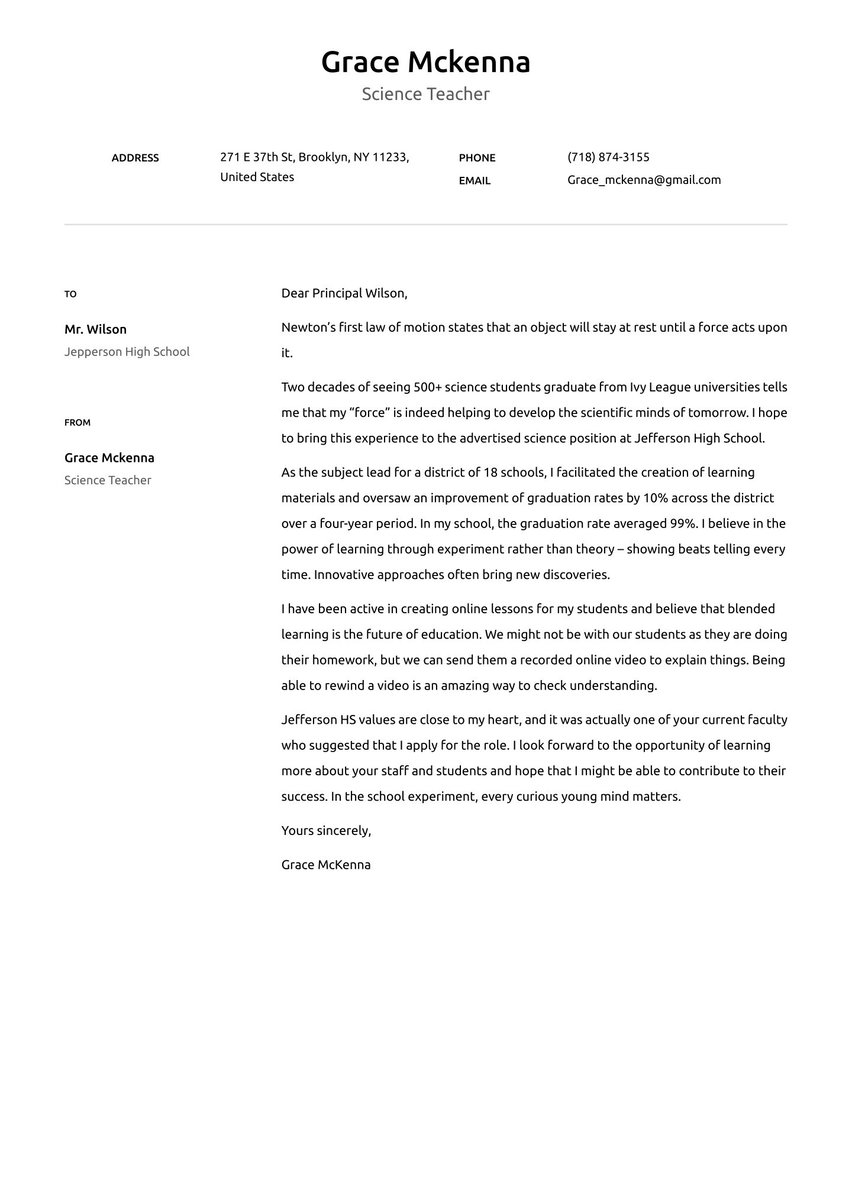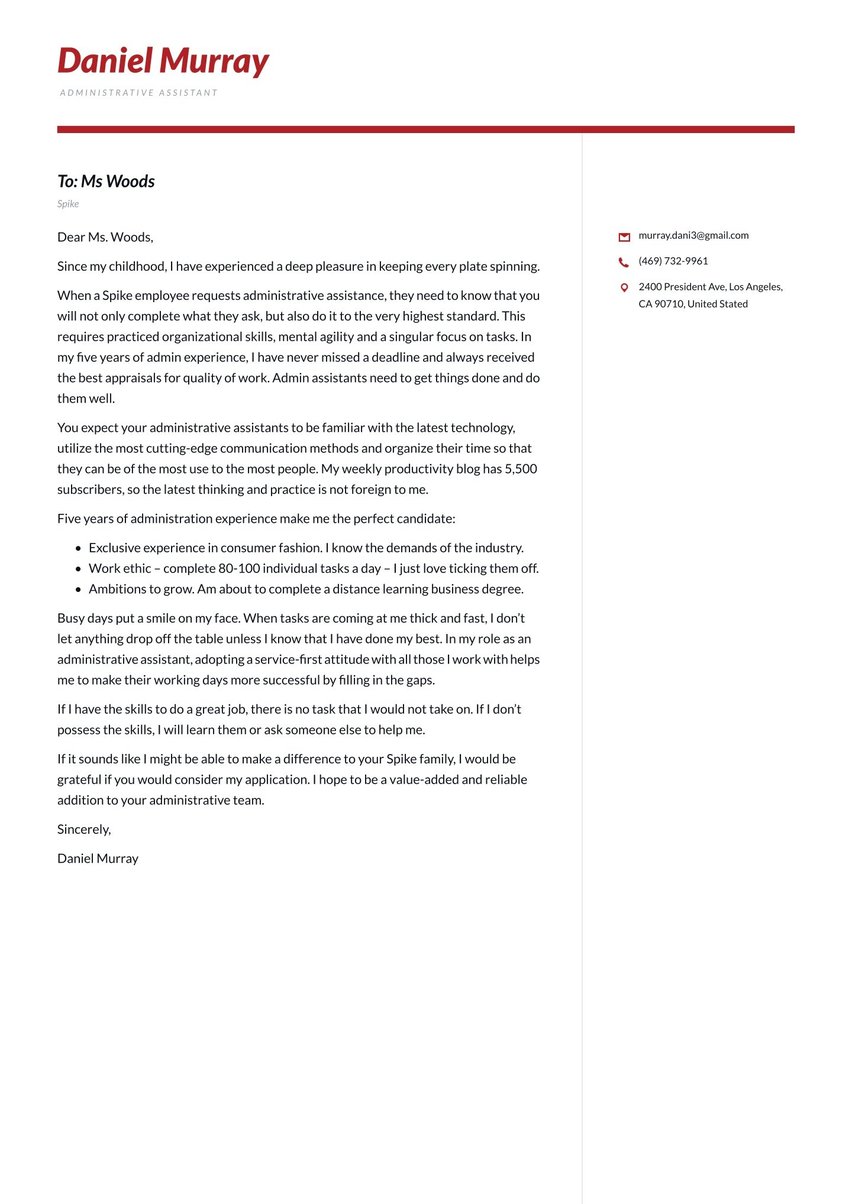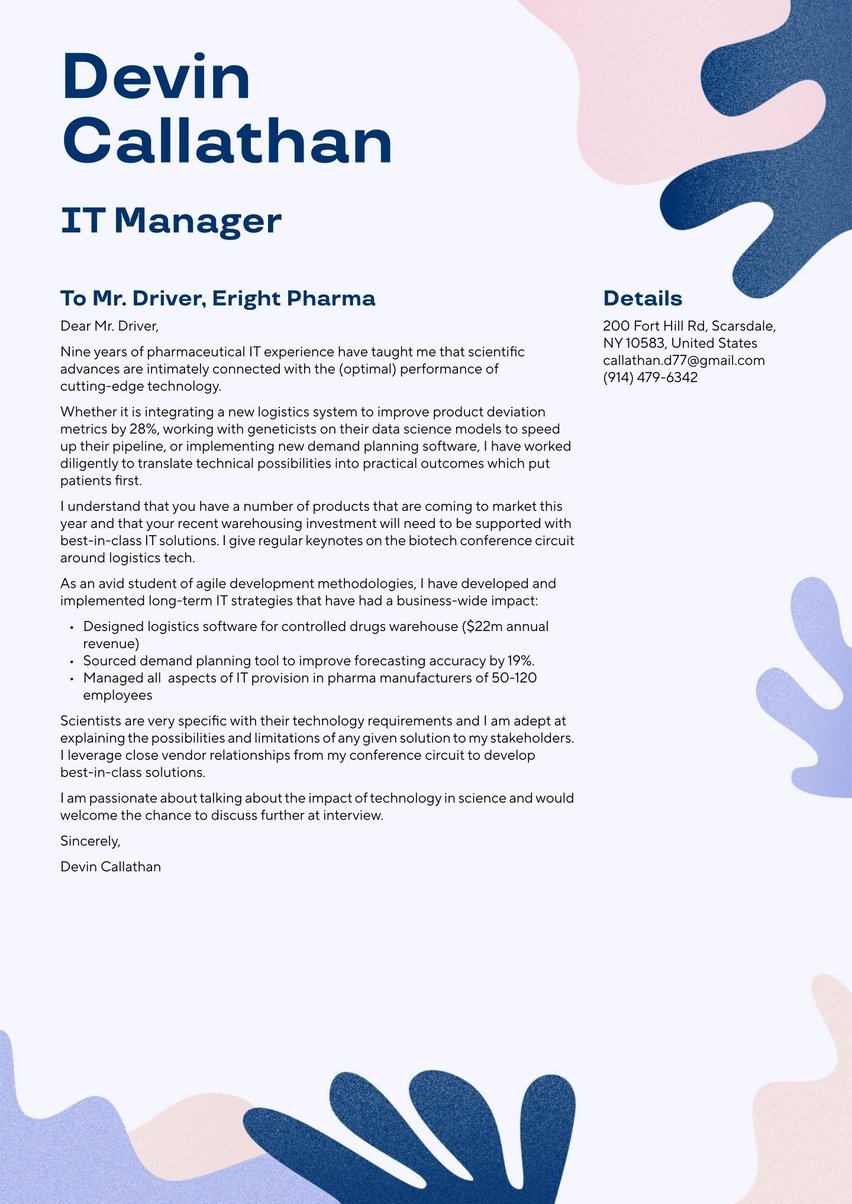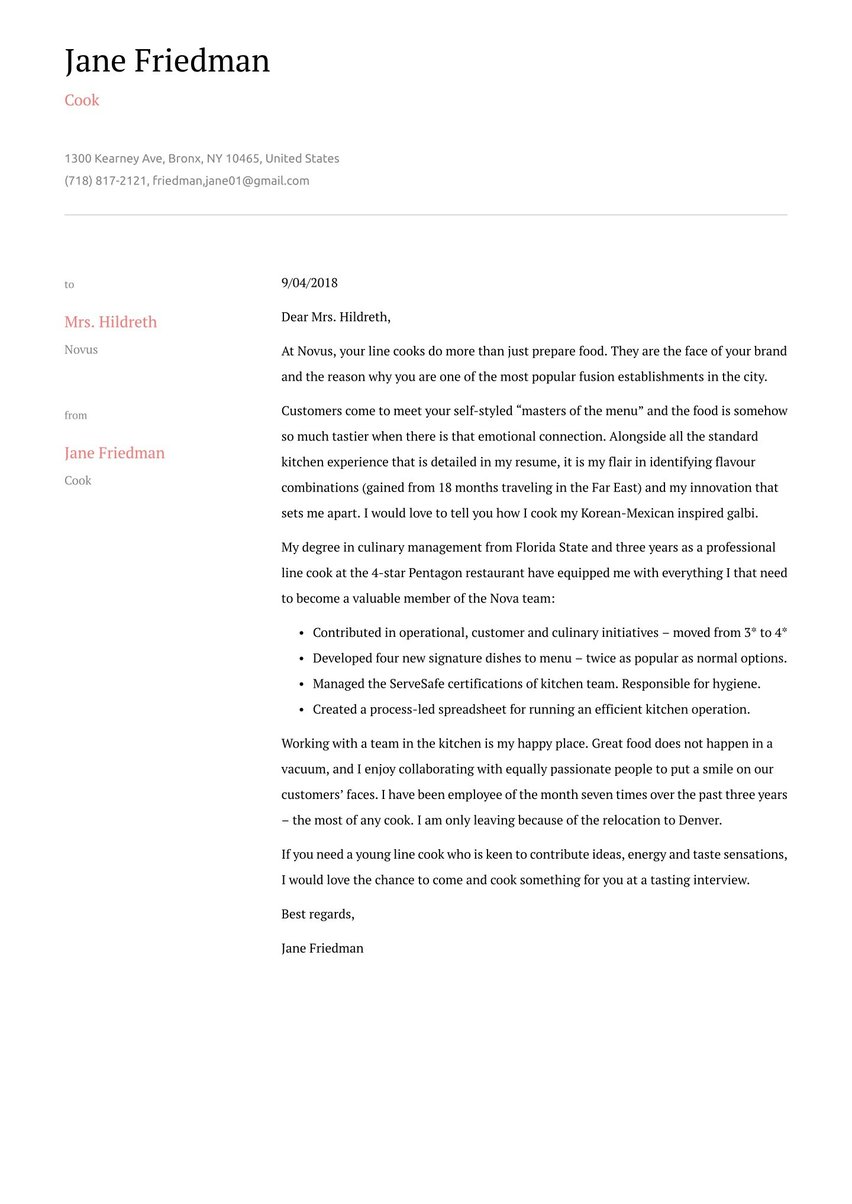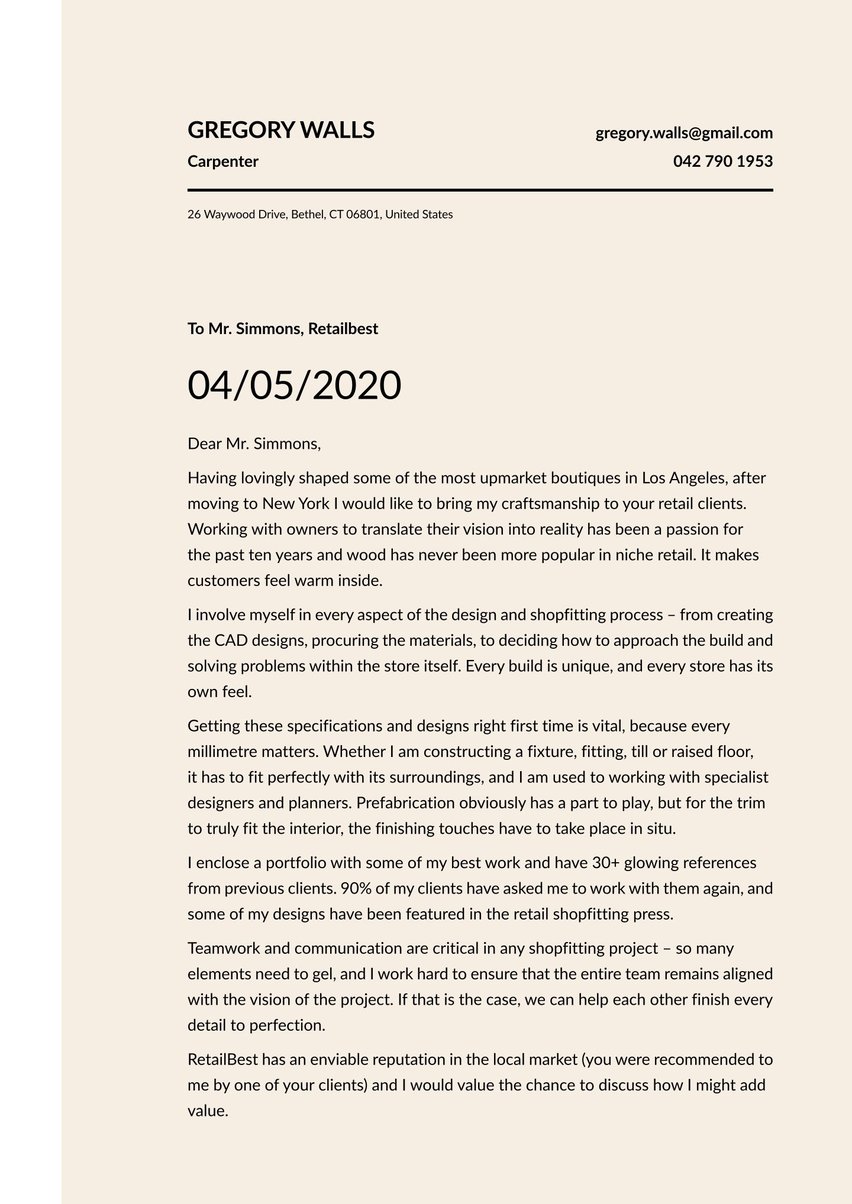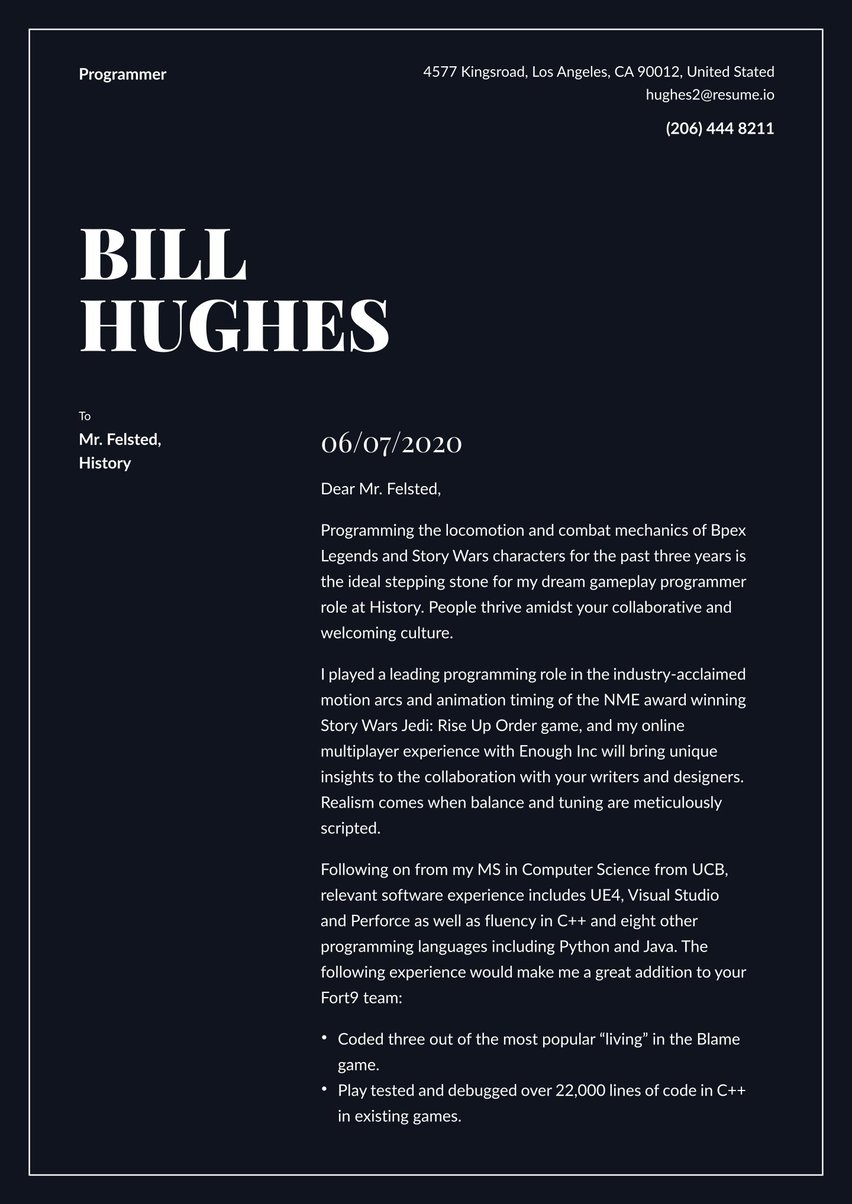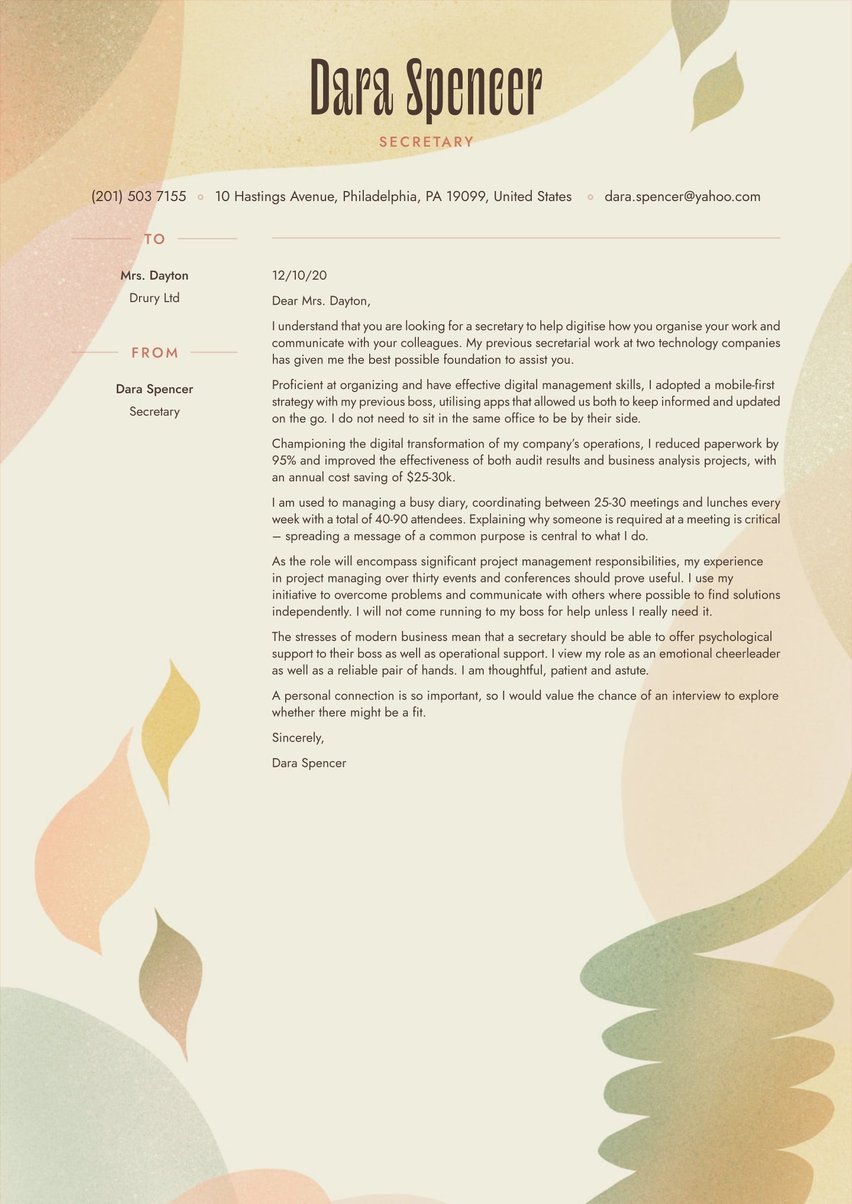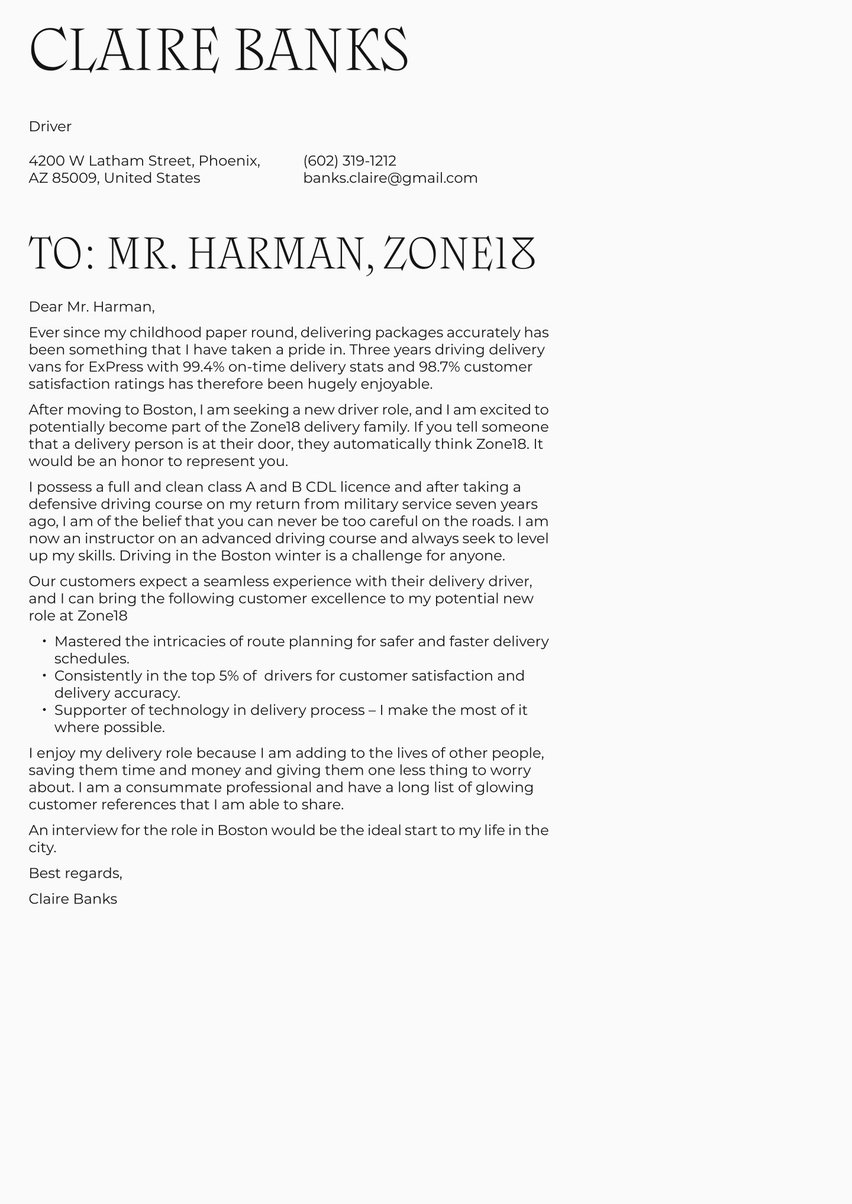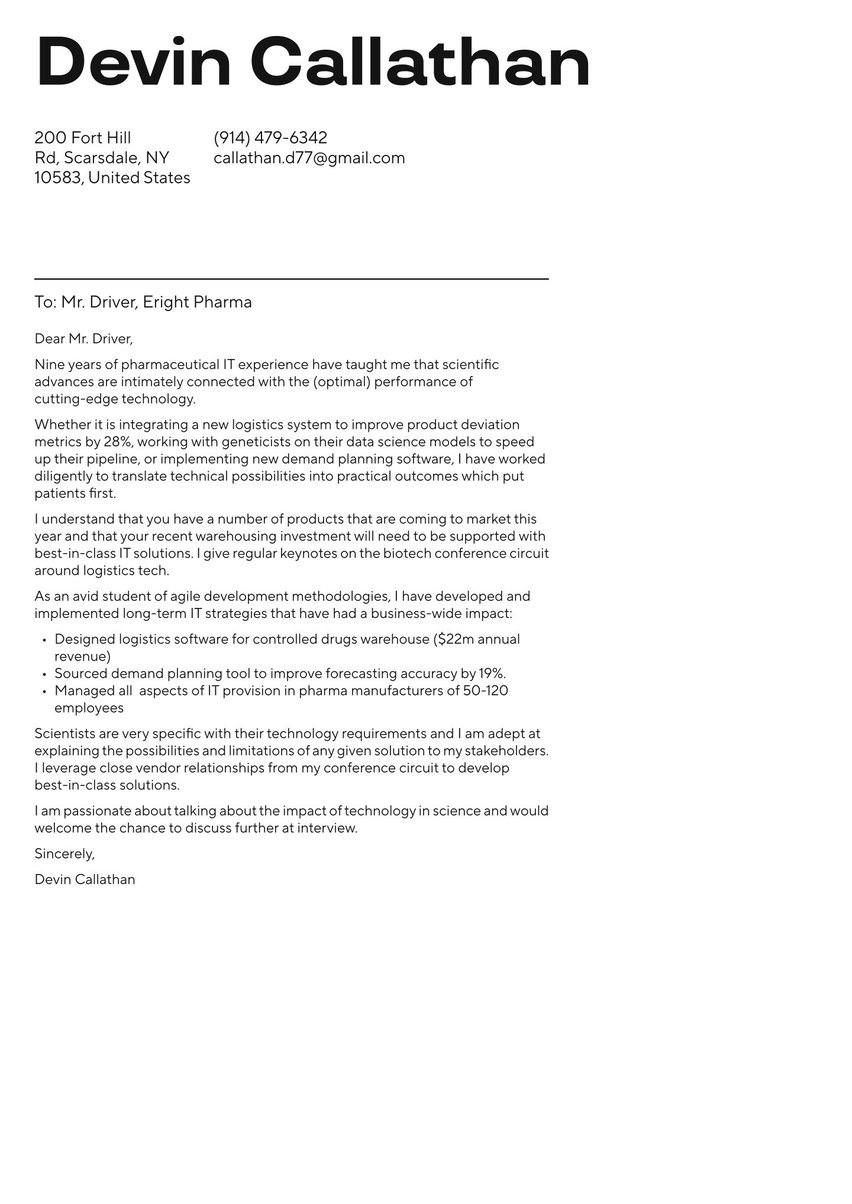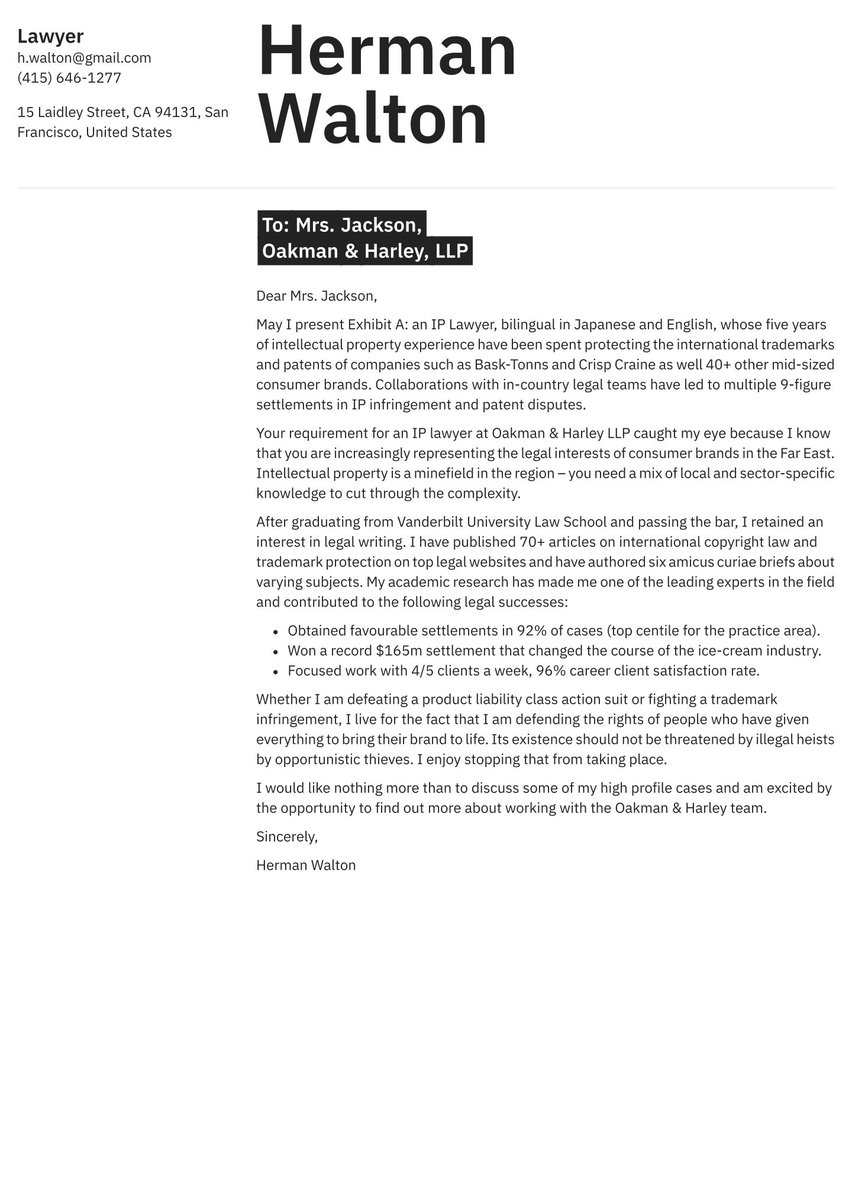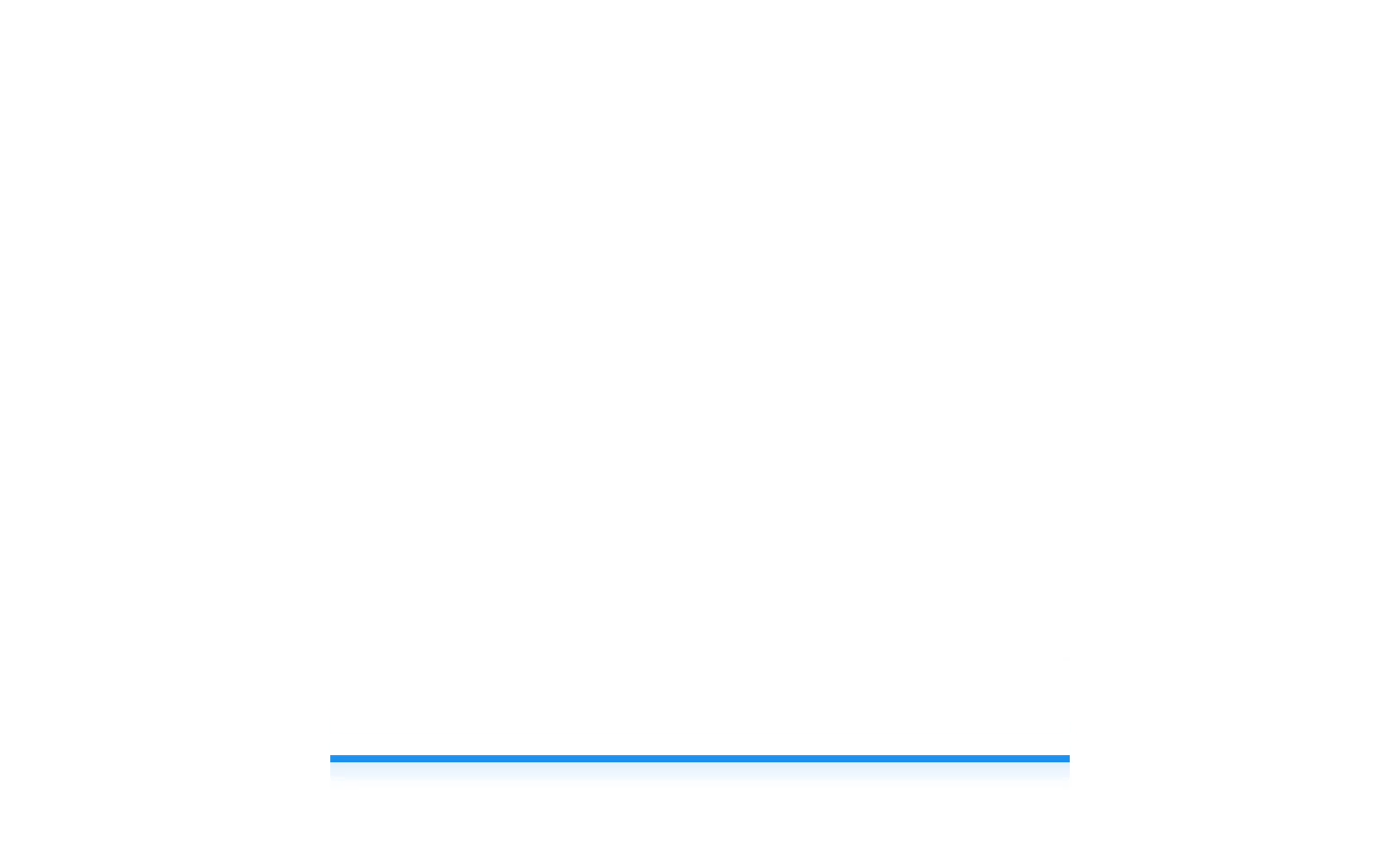As a data analyst, you know the importance of gathering information and putting it together to gain critical insight. That’s exactly what your cover letter helps hiring managers do.
A vague, boring, or disorganized cover letter risks letting hiring managers miss out on important data about your qualifications. Instead, set yourself up for success with a well-written cover letter that displays front and center why you’re exactly the data analyst they need, no further analysis is required.
Data Analyst full text-only cover letter example
August 17, 2022
Dear Ms. Malcolm,
In an era of increased competition from all sides, high-end hotel chains need to maximize the efficiency of their operations, while continuing to offer guests an unrivaled stay. My data discoveries helped my previous employer to increase occupancy rates from 85% to 94%. Such improvements allow for the financial freedom to offer guests a truly individual service. I believe data science could help East98 gain such an edge in a hyper-competitive market.
No matter how awe-inspiring the décor, or how prestigious the location, no hotel can provide a premium service if the machine is spluttering. I realize that the data analyst role is new to your organization. But I’m confident that within the first 60 days, I’ll be able to identify at least 10 projects that will improve your bottom line, and therefore the guest experience.
I obtained my Data Science degree from UCLA. During my studies and for two years after graduation, I worked for Ahhor hotels. My current job search was prompted by a decision to relocate to New York.
I am a competent programmer, with extensive knowledge of software and data management systems. My adeptness at presenting data to a senior audience using the latest visualization tools is also an asset. Above all, my achievements at Ahhor would surely be relevant to any future role:
- Built an analytical model with 40+ data sets that raised occupancy by 9% points.
- Created operations dashboard that reduced admin time by 35 hours a week.
- Implemented a new CRM software solution, increasing customer satisfaction 17%.
- Educated 3,000 employees on the importance of data – found 15 “data champions.”
Data analysts look beyond the “this is how things are done around here”mindset, instead presenting what needs to happen with cold, hard numbers. I would love to begin a discussion about the challenges that you face over the coming years. During an interview, I could offer some insights into the data difference I could bring to your business.
Yours sincerely,
Carmine DeCienzo
Sections of a data analyst cover letter
Developing a data analyst cover letter is like reporting on a data set; you will provide insight into your past experience, your qualifications, and your capacity for future achievements. Each piece of your cover letter has a role to play:
- Cover letter header. Use an attractively designed header that contains your name, title, phone number, and email address. There should be no mystery about how to reach you.
- Greeting. Make a personal connection by addressing the reader by name.
- Introduction. Open up and grab their attention by showcasing your enthusiasm for the data analyst role and how your background makes you a fit.
- Body. Dive deeper into your professional history, past accomplishments, and top skills to craft a narrative about why you’re who they’re looking for.
- Conclusion. Summarize your qualifications and reiterate your interest with a compelling call to action.
- Signature. Close with “Sincerely,” “Best regards,” “Cordially,” or the like, and sign off with your name.
Each section of your cover letter should come together to make the case about why the company should call you in for an interview. Be as concise as possible and aim for a one-page cover letter.
If you’re looking for additional inspiration for cover letter writing, check out some of our other information technology cover letter examples, including:
If you’d like more information about cover letters and details that cover each section, check out our article on how to write a cover letter.
Once you’ve crafted your header and addressed the hiring manager, it’s time to start your introduction.
Introduction of a data analyst cover letter
To effectively start a cover letter for a data analyst role, highlight a standout achievement right away. This will encourage the hiring manager to keep reading and see what else you have to share.
Perhaps it’s an extremely large and difficult data set you've worked with, or an especially innovative project you led with data-driven insights.
Dear Ms. Malcolm,
In an era of increased competition from all sides, high-end hotel chains need to maximize the efficiency of their operations, while continuing to offer guests an unrivaled stay. My data discoveries helped my previous employer to increase occupancy rates from 85% to 94%. Such improvements allow for the financial freedom to offer guests a truly individual service. I believe data science could help East98 gain such an edge in a hyper-competitive market.
Hello, my name is Alex, and I am interested in the data analyst position. I have over three years of experience and love working with data.
Whatever you choose to showcase, make it as vivid as possible. Don’t just say that you “led the charge to analyze customer data”—instead, share that your efforts “led to a 40% increase in customer retention.” A specific, quantifiable example adds credibility, doing more than just listing your qualifications.
Data analyst cover letter body
In the body of your cover letter, follow a clear template:
- Highlight your data-related skills and experience
- Show how you’d seamlessly integrate into the company’s culture
- Close out with a compelling conclusion
- Sign off with a call to action that leaves the reader excited to call you
First body paragraph: your suitability for the role (skills & experience)
Get into the meat of your letter by showing off exactly why your background aligns with the role. Make sure to read over the job posting and make sure you hit their most important requirements.
Weave your qualifications and experience into an engaging narrative:
- Highlight your education. Mention your degree in data science, statistics, computer science, or information systems, and share how it’s informed your professional career since graduation. Don’t forget to list any relevant certifications you’ve achieved, as well.
- Business acumen and problem-solving skills. Showcase how you connect data insights to company objectives, use data to support strategic decisions, and solve complex challenges.
- Automation expertise. Explain how you use Python, R, and/or SQL to automate data processes and improve efficiency.
- Data visualization skills. Share how you use tools like Tableau or Power BI to create reports and dashboards that make data accessible and digestible.
- Metrics knowledge. Document your familiarity with relevant metrics or KPIs. For example, if you’re applying to a marketing-focused data analytics role, call out your understanding of churn, customer acquisition cost, etc.
Second body paragraph(s): alignment with the organization
The next part of your cover letter should go beyond why you’re a fit for the role, and instead talk about why this company is appealing to you. Start by doing research into the company’s mission and culture and tailor the letter accordingly. Your goal is to show how you are aligned with their future success.
For instance, if you were applying to a data analyst role at Lifehouse Hotels. Their website calls out some key points and focus areas:
- Travel shapes and molds us all
- Focus on creating an environment that is comfortable and well-appointed for discovery
- Crafting a unique narrative for each hotel
- Built on a foundation of living a full life and encouraging others to do the same
If any of this resonates with you, you could incorporate stories about your own travel experiences or other adventures, showing how your passion for travel connects to your motivation to work with the company’s data. Even sharing a poignant travel or hotel experience from childhood or another important time in your life can be meaningful.
No matter how awe-inspiring the décor, or how prestigious the location, no hotel can provide a premium service if the machine is spluttering. I realize that the data analyst role is new to your organization. But I’m confident that within the first 60 days, I’ll be able to identify at least 10 projects that will improve your bottom line, and therefore the guest experience.
I obtained my Data Science degree from UCLA. During my studies and for two years after graduation, I worked for Ahhor hotels. My current job search was prompted by a decision to relocate to New York.
I am a competent programmer, with extensive knowledge of software and data management systems. My adeptness at presenting data to a senior audience using the latest visualization tools is also an asset. Above all, my achievements at Ahhor would surely be relevant to any future role:
- Built an analytical model with 40+ data sets that raised occupancy by 9% points.
- Created operations dashboard that reduced admin time by 35 hours a week.
- Implemented a new CRM software solution, increasing customer satisfaction 17%.
- Educated 3,000 employees on the importance of data – found 15 “data champions.”
Call to action & conclusion: finish off strong
Wrap up your cover letter with a quick recap, a thank-you, and a call to action. Make it clear that you’re eager to hear back from the employer to set up an interview. Express confidence that you would be a real asset to the company, and demonstrate your enthusiasm for working there.
Don’t forget, it’s always a good idea to express your gratitude and appreciation for their time.
End on a confident but respectful note with a call to action that motivates the employer to follow up.
Data analysts look beyond the “this is how things are done around here”mindset, instead presenting what needs to happen with cold, hard numbers. I would love to begin a discussion about the challenges that you face over the coming years. During an interview, I could offer some insights into the data difference I could bring to your business.
Yours sincerely,
Carmine DeCienzo
Sign off with your name as a final touch to leave the best impression.
How to write a data analyst cover letter with no experience
If you’re a recent graduate, a student seeking an internship, or making a career pivot into data analytics, your cover letter should detail your transferable skills and your enthusiasm for the industry.
Focus on these points:
- Showcase your education and coursework. Share whether you have a relevant degree (or are working on one), what impactful courses you've taken (e.g., any related to data, statistics, analytics, or programming), and any projects (either for school or on your own) that have helped you build your skills.
- Highlight transferable skills. Call out skills like problem-solving, analytical thinking, or Excel proficiency. Plus, interpreting data for users and stakeholders is an important part of a data analyst's role, so detail your ability to present and communicate effectively.
- Call out technical proficiency. Discuss how you’ve gained experience in relevant programming languages or data tools. How have you automated things or reduced manual efforts through technology?
- Showcase organizational abilities. If you have experience organizing events or managing projects, mention these to illustrate your ability to organize library resources and programs.
- Express your enthusiasm. Walk the reader through what makes you so passionate about data analysis and why you’ve chosen this as your career.
These points will come together to make up for the lack of direct experience in your cover letter and provide helpful data to the reader.
Consider ATS
An applicant tracking system (ATS) is a software system used by companies to manage applications. Some advanced systems offer tools to filter and sort applications based on how well they align with the job posting.
For the best success, review the data analyst job posting and identify important keywords. Then, incorporate them naturally in your cover letter.
Example:
- “Data analytics”
- “Python, R, SQL”
- “Stakeholder presentations”
Key takeaways
The best data analyst cover letters highlight your relevant skills, accomplishments, and passion for the industry. It’s important to get it right.
Start your job search with our resume and cover letter builder, but why stop there? Take your career further with resume.io’s 18 powerful tools.
You can search for jobs, track your journey, prepare for interviews, and negotiate salaries—all within our all-inclusive career toolkit.


